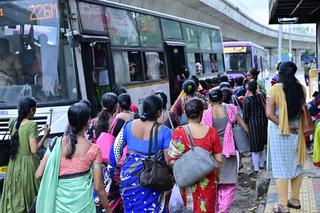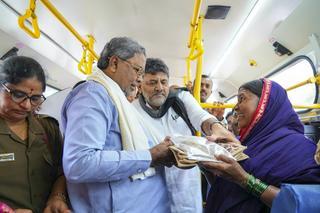Karnataka’s ambitious Shakti scheme, aimed at providing financial and social empowerment to women across the state, has recently received recognition from global authorities for setting a world record. The scheme, which focuses on promoting self-reliance, entrepreneurship, and financial inclusion, has impacted lakhs of women since its launch. Officials say the recognition highlights the effectiveness and scale of the program, which combines social welfare with economic upliftment. State authorities celebrated the achievement, noting that it underscores Karnataka’s commitment to women’s development on a national and international stage.
Background
The Shakti scheme, launched by the Karnataka government, provides a range of benefits to women, including loans, skill development, and access to government welfare programs. By targeting marginalized women, the program aims to bridge the socio-economic gap and empower participants to pursue entrepreneurship and financial independence. Over the years, it has expanded to cover tens of thousands of villages, establishing women’s SHGs (Self-Help Groups) that serve as platforms for economic activity, peer learning, and social support. The recent recognition validates the scheme’s innovative design and large-scale outreach.

Stakeholder Views
Beneficiaries of the scheme expressed immense pride and gratitude, stating that it has transformed their lives by enabling access to financial resources, skill training, and sustainable livelihoods. Women entrepreneurs credited Shakti for helping them establish small businesses, ranging from tailoring and handicrafts to dairy and agriculture-based ventures. Officials emphasized that the recognition is not just symbolic but reflects the tangible socio-economic impact on women’s lives. NGOs and social activists also lauded the initiative, calling it a model for replication in other states and countries.
Legal and Political Context
The recognition comes at a politically significant moment, as Karnataka continues to focus on women-centric welfare initiatives. State leaders highlighted that Shakti aligns with constitutional goals of gender equality and social justice, while also supporting national missions like Startup India and Skill India. Politically, the accolade allows the government to demonstrate tangible outcomes of welfare programs, strengthening its position among constituents. Critics, however, urge continuous monitoring to ensure that benefits reach the most marginalized women without bureaucratic delays or leakages.
Implementation Details
The scheme operates through a network of women-led SHGs, financial institutions, and local government bodies. Beneficiaries receive low-interest loans, grants, and technical support to start or expand micro-enterprises. Training programs are conducted in rural and semi-urban areas to develop entrepreneurship skills, digital literacy, and financial management. Officials also monitor performance through digital platforms, ensuring transparency and accountability. The coordination between government agencies, NGOs, and local communities has been credited as a key factor in achieving world record recognition.
Environmental and Social Impact
Beyond economic empowerment, the Shakti scheme has contributed to broader social development. Women beneficiaries report increased confidence, improved household decision-making, and stronger community participation. The initiative has encouraged collective problem-solving and social cohesion through SHG networks. In rural areas, where women often face systemic disadvantages, Shakti has created avenues for leadership, voice, and influence, enhancing social mobility and reducing dependence on traditional patriarchal structures.
Current Status
As of now, the Shakti scheme has enrolled over 10 lakh women, with thousands of SHGs actively participating in economic and social initiatives. State authorities are planning further expansion, targeting additional villages and introducing sector-specific training modules. The global recognition is expected to enhance funding opportunities, attract partnerships with international development agencies, and encourage replication of best practices in other regions. Officials also plan to host workshops showcasing the scheme’s success and methodology.
Expert Opinions
Social development experts view the Shakti scheme as a model of scalable women empowerment. They note that combining financial assistance with skill development and community networks creates sustainable change rather than short-term relief. Experts also stress the importance of monitoring, mentoring, and periodic evaluation to ensure that outcomes remain positive and measurable. The global recognition is seen as an affirmation of Karnataka’s forward-looking approach to inclusive development and gender-focused policy-making.

Timeline
Since its inception, the Shakti scheme has steadily expanded in coverage and impact. Initial pilot programs were launched in select districts, followed by statewide rollout with government and NGO collaboration. Monitoring and evaluation systems were gradually strengthened, incorporating digital tools for data collection and impact assessment. The recent world record recognition is the culmination of years of strategic planning, meticulous implementation, and relentless focus on women’s empowerment, marking a milestone in the program’s journey.
Conclusion
Karnataka’s Shakti scheme receiving world record recognition highlights the transformative potential of well-designed welfare programs. By focusing on women’s economic and social empowerment, the scheme has not only improved livelihoods but also strengthened communities and promoted gender equality. The accolade positions Karnataka as a pioneer in large-scale social welfare initiatives and sets a benchmark for similar programs across India and beyond. As the state plans further expansion, the success of Shakti underscores the importance of sustainable, inclusive, and scalable development models.
Several women beneficiaries have shared stories of transformation, describing how the Shakti scheme allowed them to start small businesses that changed their families’ economic trajectory. A tailoring entrepreneur from rural Mandya credited the program for providing her first sewing machine and training sessions, enabling her to generate income independently. Similarly, women engaged in dairy farming and handicrafts have expanded their production capacity with Shakti loans, collectively contributing to increased household earnings and improved standards of living.
The economic impact of the scheme is also evident at the community level. SHGs formed under Shakti facilitate micro-credit circulation, ensuring that funds reach members quickly without relying on traditional financial institutions. This local banking model strengthens social cohesion, as members are mutually accountable for loan repayment and collective business success. Analysts argue that such systems enhance financial literacy, build trust, and create sustainable economic ecosystems in rural and semi-urban areas.
Training programs under Shakti have focused not only on entrepreneurship but also on skill development and financial management. Workshops cover areas such as bookkeeping, digital marketing, product design, and quality control. By equipping women with these skills, the scheme ensures that they are prepared to manage business challenges independently. Officials report that over 75% of beneficiaries have successfully launched enterprises or enhanced existing operations, reflecting the effectiveness of combined financial and educational support.
The recognition of Shakti at a global level has drawn attention from international development organizations. Experts studying large-scale women empowerment initiatives have cited the scheme as a benchmark for integrated socio-economic development. Delegations from foreign agencies have visited participating districts to observe the implementation model, assess impact metrics, and explore possibilities for replicating similar frameworks in other developing regions.
The operational structure of Shakti is notable for its integration of government agencies, local bodies, and community-based organizations. By decentralizing program delivery through SHGs, authorities ensure close supervision while empowering women to manage daily operations. Financial institutions coordinate disbursement and repayment, while NGOs provide mentorship, training, and networking opportunities. This multi-tiered approach has been praised for balancing oversight with grassroots empowerment.
Social transformation is another key outcome of Shakti. Beyond financial independence, women report increased confidence, decision-making power within households, and leadership roles in their communities. The program has also facilitated collective advocacy, as SHGs mobilize to address local issues such as education, health, and sanitation. Experts note that empowerment at this level creates ripple effects, inspiring neighboring women and fostering inclusive social change.
Government authorities emphasize that the recognition is just the beginning of a broader strategy to enhance women’s socio-economic participation. Plans include expansion to more villages, sector-specific training in areas like agriculture, textiles, and digital services, and stronger integration with national schemes. Officials hope that continued investment in women’s entrepreneurship will contribute to long-term poverty alleviation, gender equality, and sustainable community development.
Finally, experts highlight that Shakti’s success lies in its holistic approach, combining financial, educational, and social support. By addressing multiple barriers simultaneously, the scheme ensures that women are not merely recipients of aid but active participants in shaping their economic and social futures. The world record recognition serves as a testament to Karnataka’s innovative policymaking and provides a blueprint for replicable empowerment initiatives globally.
Data from the Karnataka government indicate that the Shakti scheme has reached over 10 lakh women across 30 districts, with each district reporting varying levels of engagement and success. Districts such as Mandya, Mysuru, and Belagavi have shown the highest participation, with thousands of women forming SHGs and accessing loans for small-scale businesses. Officials report that more than 80% of funded enterprises are operational, demonstrating not only the breadth but also the effectiveness of the initiative in promoting sustainable livelihoods.
Financial metrics further underscore the scheme’s impact. Beneficiaries have collectively received loans amounting to several hundreds of crores of rupees, facilitating ventures in dairy, handicrafts, tailoring, and food processing. Repayment rates have remained high, reflecting the strong accountability within SHG networks. Analysts point out that the financial discipline instilled through the scheme has improved creditworthiness and economic literacy among participants, empowering women to plan long-term and expand their entrepreneurial activities.
District-level authorities report that training programs have been tailored to local needs. In coastal districts, women are using Shakti funds to develop fisheries and seafood processing units, while in interior districts, emphasis has been placed on agriculture, dairy farming, and textile-based micro-enterprises. Customized training modules have proven critical in ensuring that beneficiaries can maximize the utility of financial support, creating region-specific employment opportunities and boosting local economies.
Government officials have highlighted future plans to scale the scheme further. Expansion strategies include increasing the number of SHGs, offering sector-specific skill development in digital services and e-commerce, and linking women entrepreneurs to national and international markets. Authorities are also exploring technology-driven solutions, such as mobile apps for loan tracking, virtual training sessions, and real-time monitoring of SHG activities, to enhance efficiency, transparency, and accountability.
Statements from state leadership emphasize the political and social significance of Shakti. Ministers have described the recognition as a validation of Karnataka’s commitment to gender equality, economic inclusion, and social justice. Public campaigns are being planned to encourage more women to participate, while partnerships with NGOs, financial institutions, and community organizations are being strengthened to ensure holistic support. Officials stress that the program is a model of participatory governance where women are central actors in the state’s developmental journey.
Finally, experts note that the Shakti scheme is poised to serve as a template for other states and countries aiming to empower women at scale. By integrating financial support, skill development, community networks, and government oversight, the program has created measurable socio-economic change. The world record recognition not only acknowledges the program’s achievements but also reinforces the importance of designing inclusive, scalable, and sustainable models for women’s empowerment that can be adapted globally.
Follow: Karnataka Government
Also read: Home | Channel 6 Network – Latest News, Breaking Updates: Politics, Business, Tech & More

